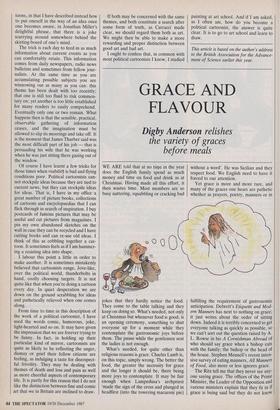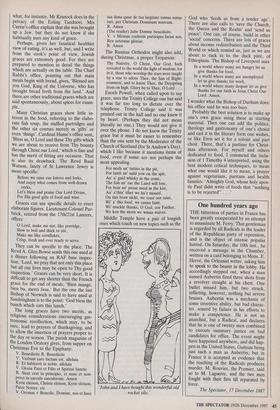GRACE AND FLAVOUR
Digby Anderson relishes
the variety of graces before meals
WE ARE told that at no time in the year does the English family spend as much money and time on food and drink as at Christmas. Having made all this effort, it then wastes time. Most members are so busy nattering, squabbling or cracking bad jokes that they hardly notice the food. They come to the table talking and they keep on doing so. What's needed, not only at Christmas but whenever food is good, is an opening ceremony, something to shut everyone up for a moment while they contemplate the gastronomic joys before them. The pause while the gentlemen seat the ladies is not enough.
What's needed, for quite other than religious reasons is grace. Charles Lamb is, on this topic, simply wrong. The better the food, the greater the necessity for grace and the longer it should be, there being more joys to contemplate. It may be fair enough when Lampedusa's archpriest `made the sign of the cross and plunged in headfirst (into the towering macaroni pie) without a word'. He was Sicilian and they respect food. We English need to have it forced to our attention.
Yet grace is more and more rare, and many of the graces one hears are pathetic whether as prayers, poetry, manners or in fulfilling the requirement of gastronomic anticipation. Debrett's Etiquette and Mod- ern Manners has next to nothing on grace; it just writes about the order of sitting down. Indeed it is terribly concerned to get everyone talking as quickly as possible, so we can't sort out the question raised by A. L. Rowse in his A Cornishman Abroad of who should say grace when a bishop eats with the family; the bishop or the head of the house. Stephen Mennell's recent inten- sive survey of eating manners, All Manners of Food, also more or less ignores grace.
The Ritz tell me that they never see any- one saying grace. The offices of the Prime Minister, the Leader of the Opposition and various ministers explain that they fit in if grace is being said but they do not know what, for instance, Mr Kinnock does in the privacy of the Ealing Tandoori. Mrs Currie's office explain that she was brought up a Jew, but they do not know if she habitually uses any kind of grace.
Perhaps, given her fanatical healthist view of eating, it's as well, but, and I write from the cook's point of view, Jewish graces are extremely good. For they are prepared to mention in detail the things which are actually on the table. The Chief Rabbi's office, pointing out that main meals begin with bread, gives, 'Blessed are you God, King of the Universe, who has brought bread forth from the land.' And there are other traditional graces which are said spontaneously, about spices for exam- ple.
Many Christian graces show little in- terest in the food, referring to the elabo- rate fish soup, the stuffed partridges and the other six courses merely as 'gifts' or even 'things'. Cardinal Hume's office sent, 'Bless us, 0 Lord and these Thy gifts which we are about to receive from Thy bounty through Christ our Lord,' which is fine and has the merit of fitting any occasion. That is also its drawback. The Revd Basil Watson, lately of St Lawrence Jewry is more specific:
Before we raise our knives and forks, And enjoy what comes from well-drawn corks, Let's bless and praise Our Lord Divine, For His good gifts of food and wine.
Graces can use specific details to erect elaborate figures. Lieutenant-Colonel Pur- brick , retired from the 17th/21st Lancers, offers:
0 Lord, make me not, like porridge, Slow to boil and thick to stir, Make me like cornflakes, Crisp, fresh and ever ready to serve.
They can be specific to the place. The Revd A. Glen Bowie sends this one used at a dinner following an RAF base inspec- tion, 'Lord, we pray that not only this place but all our lives may be open to Thy good inspection.' Graces can be very short. It is difficult to get any shorter than the French grace for the end of meals, 'Bien mange, bien bu, merci Jesu.' But the one the last Bishop of Norwich is said to have used at Sandringham is to the point: 'God bless the bunch which eats this lunch.'
The long graces have two merits, as religious considerations encouraging gas- tronomic recollection, which may, to be sure, lead to prayers of thanksgiving; and to allow the insertion of prayers proper to the day or season. The parish magazine of the London Oratory gives, from supper on Christmas Eve to the Epiphany:
V. Benedicite R. Benedicite V. Verburri taro factum est, alleluia R. Et habitavit in nobis, alleluia V. Gloria Patri et Filio et Spiritui Sancto R. Sicut erat in principio, et nunc et sem- peret in saecula saeculorum. Amen Kyrie eleison, Christe eleison, Kyrie eleison, Pater Noster, etc V. Oremus + Benedic, Domine, nos et haec tua dons quae de tua largitate sumus sump- turi, per Christum Dominum nostrum.
R. Amen (The reader) Jube Domne benedicite.
V. + Mensae coelestis participes faciat nos, Rex aeternae gloriae.
R. Amen
The Russian Orthodox might also add, during Christmas, a proper Troparion:
Thy Nativity, 0 Christ, Our God, hath revealed to the world the light of wisdom; for in it, those who worship the stars were taught by a star to adore Thee, the Sun of Right- eousness, and to know Thee, the Dayspring from on high. Glory be to Thee, 0 Lord . . .
Enoch Powell, when called upon to say grace, uses the Trinity College one but said it was far too long to dictate over the telephone. Trinity College said it was printed out in the hall and no one knew it by heart. (Perhaps they did not mean literally no one.) They would not give it over the phone. I do not know the Trinity grace but it must be easier to remember than the one sent by the Moderator of the Church of Scotland (for St Andrew's Day), which I like because it mentions items of food, even if some are not perhaps the most appealing.
For neels an' tatties in the pit, For lamb an' auld yow on the spit, An' a' guid whisky in the cruse, The fish an' rae the Laird will lose, For bear an' pease meal in the kist, An' a'thin' ither we ha'e missed.
On this braw nicht, we toast oor saint, Wi' a' this food, we canna faint.
Wi' muckle thanks, 0 God, oor Faither, We ken the morn we winna waiver. Middle Temple have a pair of longish
ones which touch on new topics such as the 'John and I have bought this wonderful old rocket silo.' God who 'feeds us from a tender age'. There are also calls to 'save the Church, the Queen and the Realm' and 'send us peace'. One can, of course, build in other 'social' concerns. There are lots of graces about income redistribution and the Third World or which remind us, just as we are about to tuck in to the duck pâté, of Ethiopians. The Bishop of Liverpool uses
In a world where many are hungry let us give thanks for food, In a world where many are unemployed let us give thanks for work, In a world where many despair let us give thanks for our faith in Jesus Christ Our Lord. Amen.
I wonder what the Bishop of Durham does: his office said he was too busy.
Probably the best solution is to make up one's own grace using these as starting material. Then one can add the politics, theology and gastronomy of one's choice and cast it in the literary form one wishes, or like Eton set it for a soloist and part choir. There, that's a pastime for Christ- mas afternoon. For myself and others dedicated to food, I commend the inclu- sion of 1 Timothy 4 interpreted, using the best modern critical techniques, to mean what one would like it to mean, a prayer against vegetarians, puritans and health fanatics: 'Almighty God, whose holy apos- tle Paul didst write of foods that "nothing is to be rejected" . .











































































































 Previous page
Previous page